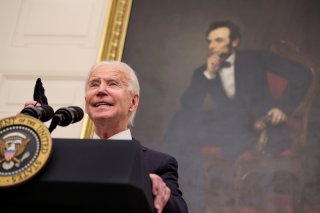$1000 Stimulus Checks Every Month: Could This Be in America's Future?
Andrew Yang, the former Democratic presidential candidate and the current frontrunner in the New York mayoral election was able to draw attention to himself through a signature proposal – the “Freedom Dividend,” a universal basic income (UBI) payment of $1000 per month to every adult American with no strings attached.
Andrew Yang, the former Democratic presidential candidate and the current frontrunner in the New York mayoral election was able to draw attention to himself through a signature proposal – the “Freedom Dividend,” a universal basic income (UBI) payment of $1000 per month to every adult American with no strings attached.
Yang’s unusual dark horse presidential campaign did not ultimately overtake more conventional Democratic politicians, including the eventual winner, current President Joe Biden. But his campaign helped to popularize the idea of giving Americans free money as a solution to social problems. And while UBI remains an experimental idea, an increasing number of cities are toying with the closely related concept of a guaranteed income, a cash payment to Americans below a certain poverty level. In this way, it is hoped that the programs can provide a basic standard of living to all Americans, no matter how poor.
California will likely become a trend-setter in this regard. Faced with a windfall of $75 billion in surplus money, Governor Gavin Newsom introduced a $35 million program to assist states in experimenting with guaranteed income programs for low-income residents. Even before the proposal, California had already been one of the most fertile grounds for experiments in guaranteed income; a large study in the city of Stockton from 2017 until 2019 showed that, in spite of vapid criticism from some corners, most residents spent the extra money on essential or pragmatic items rather than discretionary ones, and emerged from the studier happier, more employed, and better-off economically.
More recently, Libby Schaaf, Mayor of Oakland, received harsh criticism after she announced a guaranteed income pilot program of $500 per month for six hundred Oakland residents of color that was perceived to exclude poor white people on the basis of their race. (The program was later expanded.)
While a guaranteed income seems to come with few downsides, there are a number of arguments against it. The difficulty of paying for it, of course, is one. More interestingly, perhaps, is the libertarian argument that paying only the poorest citizens creates a disincentive for success, since success means losing guaranteed income payments. This was one of the arguments against guaranteed income introduced by advocates for universal basic income during the Yang campaign.
Still, Yang himself appears to have shifted in his position. One of his campaign proposals has been a basic income program for the 500,000 most needy New Yorkers, promising them roughly $2000 per year – a proposal that amounts to guaranteed income over UBI.
Trevor Filseth is a news reporter and writer for the National Interest.

